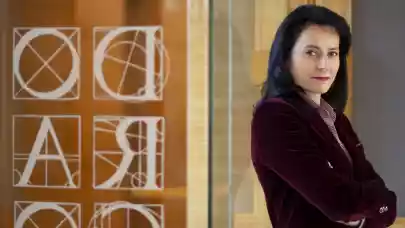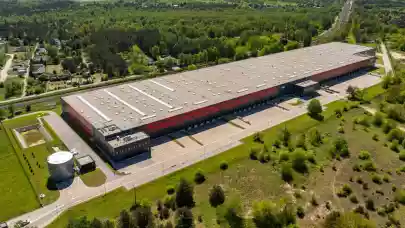
Angelika Cieślowska, President of the Management Board of KB DORACO, one of the largest Polish construction companies, talked to Property Forum about the impact of the war in Ukraine on the construction industry, high prices of energy and raw materials and the possible scenarios of market development.
Airports, seaports, stadiums, hotels, shopping centres, residential buildings, warehouses - is there anything KB DORACO does not build?
This is a fickle question. We have grown together with the market and over the company's thirty-year history we have had the opportunity to realise a very wide range of investments. As a company rich in the technical know-how of our ambitious engineers, we love challenging subjects, especially those that have only just emerged in the minds of investors. The world is changing fast and we are changing with it. Today, the investor expects us to carry out the complete investment process, from formal issues through design to the commissioning of the facility. We also often organise the financing of the project together with the investor. Today if I were to say whether DORACO is a construction company I would rather say that it is the engineer of the entire investment process. Of course, there are groups of projects such as railway or motorway projects, and that's where we're not really present. On the other hand, water and hydraulic engineering are our beloved environment.
You recently won a tender for the reconstruction of the Bank Gospodarstwa Krajowego office building in Warsaw at the representative address Aleje Jerozolimskie 7. Please tell us about this project.
It is a challenging but very interesting project that fits perfectly into our remit to modernise historic buildings. The edifice was designed and built nearly 100 years ago, survived the Second World War and is listed in the register of historical monuments. Our task is to carry out internal refurbishment works including the superstructure of the two connectors. We are restoring to a large extent the pre-war historic shape of this building while maintaining its existing functionality. We will be restoring and reconstructing many of the original elements, such as, for example, stone cladding and flooring, wooden doors and fittings, mosaics in the representative area, counters or historic furniture. All work is being carried out under the strict control of the conservation officer. In addition to preserving the historic character of the interiors, the challenge is above all the scale and technical implementation of the entire project. The building has a total usable area of as much as 25,000 square metres and has up to seven floors above ground plus an underground section. In addition, it is located in the very centre of Warsaw, which requires excellent organisation of all works. We only have just over two years to complete all the contracted tasks.

Angelika Cieślowska
President of the Management Board
KB DORACO
What impact did the outbreak of war in the East have on DORACO's operations? Have you, like other general contractors, had to deal with a sudden outflow of workers from Ukraine?
First and foremost, the war has caused a stir, a re-evaluation in the day-to-day business, as well as in the lives of ourselves and our employees. Each of us supports Ukraine. We fully understand the situation. However, the exodus of employees was sudden. Dozens of people were leaving from one day to the next. We felt this most acutely during the construction of the Pogoń Szczecin stadium, which was at a crucial stage of completion. At that time there were several hundred people on site every day. Today we can speak of a certain stabilisation in this respect. Nevertheless, we are looking to the future and we know that the war in Ukraine may have a few more scenes. The situation has the potential to repeat itself. We are at a unique moment on the axis of history and today any scenario is possible. I firmly believe that in a few years' time, together with Ukraine and the Baltic States, we will be building a new strong alliance and rebuilding everything that Putin's terrorism is destroying with such fierceness today.
And how are your subcontractors coping with this problem?
The turnover of workers from Ukraine has always been at a fairly high level. Although the situation took everyone by surprise, we all knew how to deal with it. After a momentary panic, subcontracting companies efficiently rebuilt their workforce potentials. Unfortunately, this had a direct impact on increased labour costs and the profitability of all participants in the construction process.
What challenges are you facing with regard to the continuing price increases of building materials and energy raw materials?
For the first time in the history of the free market in Poland, we are experiencing a period of overlapping of various unfavourable phenomena. Certainly one of the biggest challenges for the industry is the unprecedented increase in the cost of raw materials. This translates into high price dynamics for building materials and components, the scale of which is often unpredictable and speculative. We deal with this phenomenon through efficient and well-organised supplier contracting processes on all our projects. On top of this, there is also uncertainty about the development of energy costs, concerns about the growth potential of foreign markets or the availability of production capacity. The situation of our potential customers is also a major challenge. Concerns arise as to whether investments will be made, or perhaps suspended, or whether they will have adequate financing. As a result, we have to react quickly and modify our strategic actions on an ongoing basis. We cope with this very well. In executing projects for both public and private investors, in addition to a completely new approach to costing, risks, and the time function of money, we have developed, in our view, an effective pricing and contracting policy. It takes into account, among other things, valorisation mechanisms, a flexible approach at the negotiation stage, and completely new ways of settling contracts, which, with a dose of trust, allow us and investors to realise common intentions.
Given the high level of uncertainty in the markets, aren't banks reducing financing for general contractors?
It is noticeable, of course, that financial institutions are more cautious in providing support. This is understandable in the current situation, but stable companies with adequate facilities still have good access to external sources of financing. As DORACO we feel very comfortable in this respect. In addition, being part of the family holding company HASS HOLDING, we are assured of financial stability.
Which segment of the real estate market do you think will develop fastest in the current market conditions?
The premium sector is certainly particularly resistant to the lack of financing and limited access to mortgages. Residential properties developed in the best locations and built to the highest standard, regardless of the market situation, always remain one of the best forms of investment and capital investment. As part of DORACO Investment, we are currently developing the unique Gaja Park project in the charming part of Gdańsk's Jelitkowo. Properties for lease built for the needs of funds operating in the PRS area also have great growth potential. The large increase in interest in rental units is not only due to financial reasons. It is also the result of generational changes. There is now a greater willingness among Poles to migrate, as well as a better adaptation of the size and functionality of real estate to the needs arising from the current stage of life. In the area of commercial space, on the other hand, we are still experiencing a boom in warehouse and logistics investments.
What plans does DORACO have for the next 24 months?
With a full order book, we will certainly have something to do during this period. With our financial and logistical potential and specialised experience, we can provide a full range of construction services, including complex EPC (Engineering, Procurement, Construction) projects. However, there are many challenges ahead of us. We need to be mindful of strengthening activities related to strategic analysis, sales optimisation and flexibility, and quality in the broadest sense, including the implementation of digital solutions. This will actually translate into all areas of our business. In the current economic climate, only companies focusing on all processes, not only sales but also quality, optimising costs, and improving and expanding employee competence, have a chance to increase efficiency and thus remain competitive. Together with the entire capital group, DORACO is intensifying its activities strategically, strengthening its position as a leader in the hydraulic engineering sector. We are also betting on increasing our presence in nationwide general contracting with particular emphasis on the Warsaw region. I also hope that the topic of rebuilding Ukraine will come before us during this time. Preparations for this should start now by helping the citizens of this country to acclimatise in Poland, providing them with the opportunity to start working in the industry or obtain the nostrification of their diplomas. We are also among the largest general contractors that have been selected as partners in the strategic project to build nuclear power plants as part of the development of Poland's nuclear programme.



